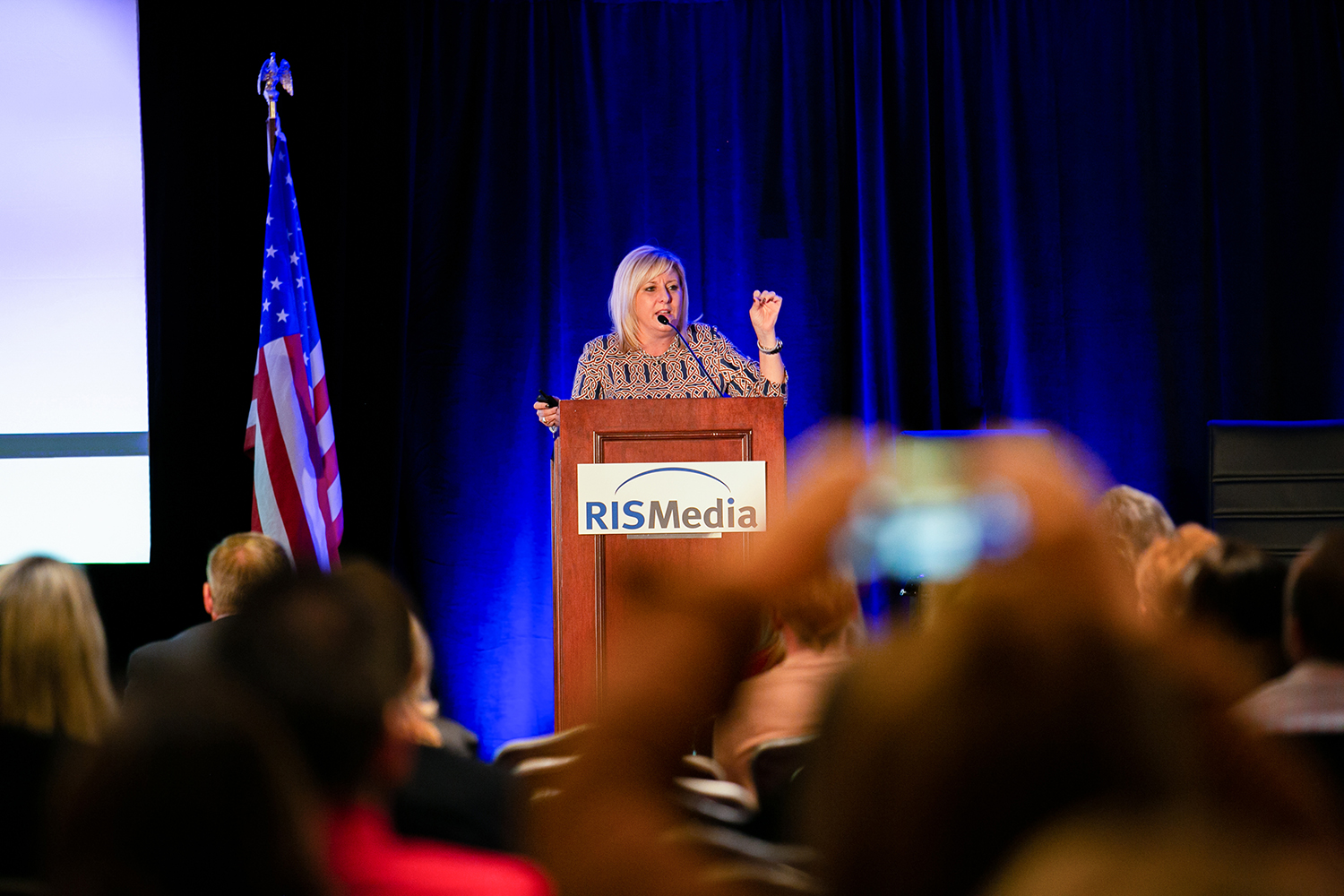(Above, L to R) Sherri Johnson, Sherri Johnson Coaching & Consulting; Allan Dalton, Real Living Real Estate; Carolyn Rosson, Ebby Halliday Companies; Sue Yannaccone, Coldwell Banker/NRT; and Teresa Palacios Smith, HSF Affiliates, discuss “Mastering Sales Driven Leadership by Adding Real Value in Recruiting and Retention” at RISMedia’s 2019 Real Estate CEO Exchange. (Credit: Korin Krossber of PlanOmatic)
When it comes to hiring a REALTOR®, consumers have options—and agents, too, when affiliating with a broker. On the brokerage side, the keys to maximum recruitment and retention? Consistently developing new talent, in addition to facilitating growth internally, according to coach Sherri Johnson.
“There are two ways to grow our operations,” explained Johnson at RISMedia’s 2019 Real Estate CEO Exchange, held in New York City Sept. 18 – 19. “One, recruiting, and, two, growing the people we already have. That’s the reason they’re going to stay with your company—because you helped them grow their business. That is not transferable.”
At the annual event, which gathered more than 300 industry leaders at the Marriott Marquis in Times Square, Johnson and Allan Dalton, CEO of Real Living Real Estate; Teresa Palacios Smith, HSF Affiliates vice president of Diversity & Inclusion; Carolyn Rosson, vice president for the Ebby Halliday Companies; and Sue Yannaccone, Coldwell Banker/NRT regional executive vice president, Eastern Seaboard & Midwest Regions, discussed “Master Sales-Driven Leadership by Adding Real Value in Recruiting and Retention,” addressing the challenges of recruitment and retention, and how brands can firm up value, and continue to grow strategically.
The first step, according to the panelists? Building a hands-on office management team, who can create cultures designed for high performers, as well as an environment for growth for new recruits.
“Are your managers invaluable?” Johnson posed. “Are they sales managers, or desk managers? Desk managers are sitting at their desk waiting for their agents to come to them with legal or contract problems. You have to be out in front. Coach your management teams; inspire them to make a difference, put a plan together and have goals tracked and measured.”
“In my own office, availability—being able to coach one-on-one with each of the agents,” Rosson said. “I rarely sit at my desk; I’m up and around visiting with agents. I know what’s going on in their lives. Those personal relationships are what has not only created an amazing culture in the office, but also propelled morale and production. Happy people produce more.”
“We learn everybody’s history of what makes them who they are—how did you get started? How did you grow up? What was the best thing you did in high school?” Palacios Smith said. “Those things are very personal. It’s really getting to know the person.”
The concept of “culture,” however, is mysterious—and the definition and execution, often subjective, according to Yannaccone.
“I believe culture defines itself,” she said. “You have to watch that very closely. How quickly have we seen an office rocked because the wrong individual has joined that office for the sake of growth or hitting some number? Culture is something you really have to protect.”

Sherri Johnson, Sherri Johnson Coaching & Consulting, at the CEO Exchange (Credit: Korin Krossber of PlanOmatic)
“Culture is your story—your story about your company, your story about your brand, about your particular office,” Rosson said. “That is how we attract sales professionals to our offices.”
In addition to culture, agents are looking for value—not only competitive splits and technology, but also, assistance in promoting the REALTOR®’s value, amid more options.
“We have to help agents convert databases into client bases,” Dalton said. “We’re charging people surgeon-like fees, and we’re validating it by ‘giving great service.’ We have to be able to articulate to agents that we’re looking to bring into the company that we, better than anyone else, understand the threats that they have.”
He added, “We have to be able to help REALTORS® go from being transactional to relational—to repurpose and redefine their essence and their value in an era that is going to become much more efficient in terms of the transaction.”
“It’s really important that we are able to provide our agents the opportunities, and make sure that they understand the business that they’re in—to start thinking, ‘I want to be your real estate agent because I’m invested in you,'” Palacios Smith said.
Agents, also, are chasing personal and professional success, and flexibility, the panelists shared.
“A lot of our sales professionals want work-life balance,” Rosson said. “They are performing at a very high level, spending many hours getting better at their trade. As the broker, it’s our job to help and assist them in any way. I can’t tell you how many sales associates we’ve attracted to our firm that are high performers, and their biggest ask is, ‘Can you help me have more work-life balance?’ I think that’s critical to the mix.”
It can help to offload tasks, Palacios Smith said, but that requires training.
“Half of our managers don’t even know we have tools,” she revealed. “It’s important that we are able to teach those tools and use those resources every day, and make sure that we’re able to transfer that information over to the agent and to the teams that need that help, so that their work-life balance is in place.”
Ultimately, agents are looking for support, whether to get off the ground, lighten the load or offer a shoulder—and if brokers can communicate that they’re the solution, they win.
“Help agents understand what you offer within your set of core values, and how you’re focused on wealth-building and helping agents retain more of their hard-earned money,” Yannaccone said. “Coach them to confidence. If you’re providing value to help them grow their business, it builds a relationship with them.”
For CEO Exchange continuing coverage, visit RISMedia.com.
 Suzanne De Vita is RISMedia’s online news editor. Email her your real estate news ideas at sdevita@rismedia.com.
Suzanne De Vita is RISMedia’s online news editor. Email her your real estate news ideas at sdevita@rismedia.com.











